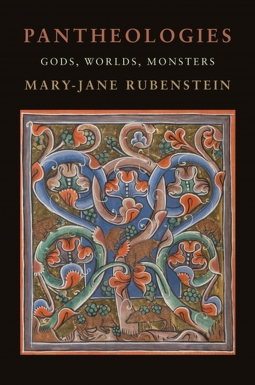
Pantheologies
Gods, Worlds, Monsters
by Mary-Jane Rubenstein
This title was previously available on NetGalley and is now archived.
Send NetGalley books directly to your Kindle or Kindle app
1
To read on a Kindle or Kindle app, please add kindle@netgalley.com as an approved email address to receive files in your Amazon account. Click here for step-by-step instructions.
2
Also find your Kindle email address within your Amazon account, and enter it here.
Pub Date Nov 06 2018 | Archive Date Feb 28 2019
Talking about this book? Use #Pantheologies #NetGalley. More hashtag tips!
Description
In this book, Mary-Jane Rubenstein investigates this perennial repugnance through a conceptual genealogy of pantheisms. What makes pantheism “monstrous”—at once repellent and seductive—is that it scrambles the raced and gendered distinctions that Western philosophy and theology insist on drawing between activity and passivity, spirit and matter, animacy and inanimacy, and creator and created. By rejecting the fundamental difference between God and world, pantheism threatens all the other oppositions that stem from it: light versus darkness, male versus female, and humans versus every other organism. If the panic over pantheism has to do with a fear of crossed boundaries and demolished hierarchies, then the question becomes what a present-day pantheism might disrupt and what it might reconfigure. Cobbling together heterogeneous sources—medieval heresies, their pre- and anti-Socratic forebears, general relativity, quantum mechanics, nonlinear biologies, multiverse and indigenous cosmologies, ecofeminism, animal and vegetal studies, and new and old materialisms—Rubenstein assembles possible pluralist pantheisms. By mobilizing this monstrous mixture of unintentional God-worlds, Pantheologies gives an old heresy the chance to renew our thinking.
Advance Praise
In Pantheologies, Mary-Jane Rubenstein answers the old problem of the One and the Many by offering a resolute triumph of the Many over the One. Give Rubenstein a One—any one—and she will make a many out of it. I applaud this temperament, as William James called it, and the intuition that it generates and reflects. Multiplicity, thy name is woman. Rubenstein will save us every time from the totalitarian tendencies of certain regions of process philosophy, from the teutonic idealisms of post-Hegelian theologies, even from the totalizing forms of monistic pantheisms.
-Nancy Frankenberry, John Phillips Professor in Religion, Emeritus, Dartmouth University
Available Editions
| EDITION | Other Format |
| ISBN | 9780231189460 |
| PRICE | $37.00 (USD) |
Average rating from 1 member
Featured Reviews
 Librarian 97571
Librarian 97571
A well-written contribution to the area of philosophy and religious studies, and a fascinating examination of western theology and how it has historically (and currently) had a highly gendered and racialized horror of the very idea of pantheism. In addition, anyone interested in the American transcendentalists (Emerson, Thoreau, etc) will find this a fascinating and illuminating companion to their work. I also enjoyed the call backs to thinkers like Giordano Bruno and Spinoza.
I won't be recommending this for my library to purchase because of the highly specific nature of my library. But I will be recommending that other libraries buy it, including my undergraduate college's library.



